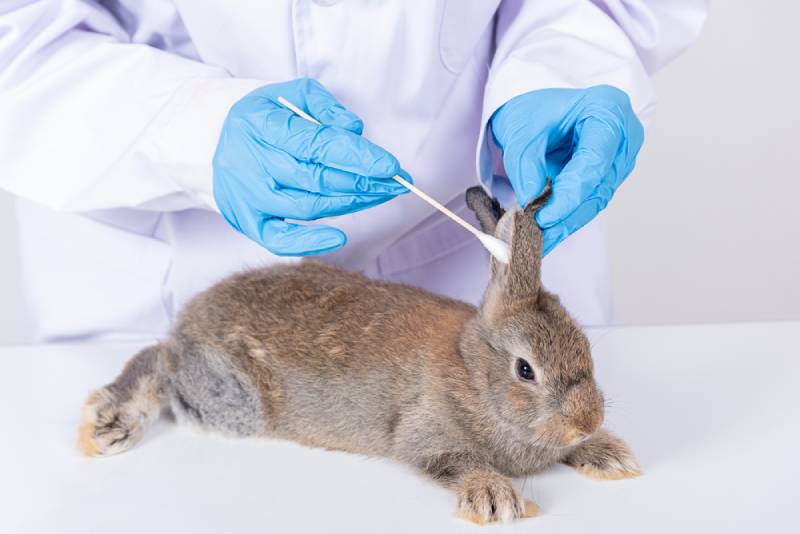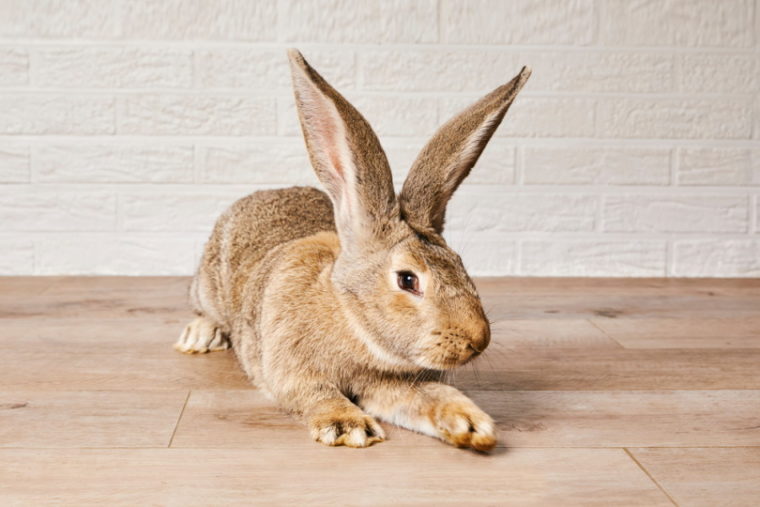
As much as we love our fuzzy and adorable pets, part of owning one means dealing with the messier aspects, particularly when it comes to urine. Regardless of what kind of pet you have, you’ve probably had to clean up after them at some point.
While rabbits can be litter box trained, they will still have the occasional accident. But what if your beloved bunny peed on your gorgeous hardwood floors? Time is of the essence, so cleaning it up as soon as possible is necessary.
Here, we go over the best methods for cleaning up rabbit urine off your wood floors and hopefully, preventing any stains from setting in.
Before We Begin Cleaning
First, if your rabbit has just urinated on your floor, if you mop it up quickly, it shouldn’t have time to stain. Removing the urine immediately will also allow you to see how bad the stain is.
Next, you need to gather your cleaning supplies:
How to Get Rabbit Pee Out of a Wood Floor
1. Make Your Vinegar Solution
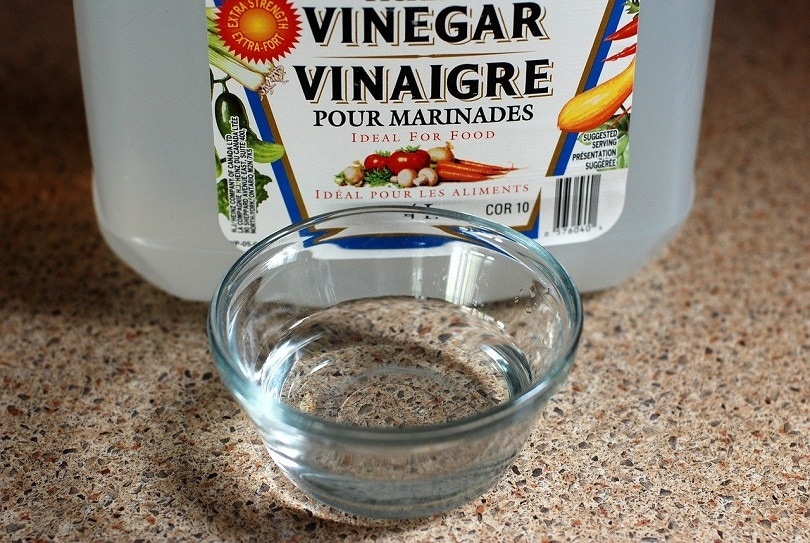
Start by filling the empty spray bottle with half white vinegar and half water, and then shake it up. Alternatively, you can pour the vinegar and water solution into a bowl, but spraying the solution gives you extra control over the amount that you’re using and can evenly distribute it over the stain.
You can increase the amount of vinegar, but you should only do so if you believe that the stain is really set in. Typically, the half-and-half ratio is sufficient.
Technically, you could use undiluted vinegar because it won’t damage your floor, but you might find the smell overpowering.
White vinegar is quite effective at breaking down the uric acid found in urine. It works to remove both the stain and the odor.
2. Remove the Excess Urine
If the urine is still fresh, you need to remove as much of it as possible before starting the cleaning process. The sooner you do so, the better.
Use a clean, dry cloth or paper towels, and carefully dab up the urine. You don’t want to rub it, as you’ll push the urine deeper into the floor and spread it around more.
However, if you’re looking at an old urine stain, it’s possible that you might need to change your flooring, as urine can be quite damaging.
The longer the urine sits, the more damage it causes. Old stains can leave a high concentration of ammonia behind, which has the potential of literally etching into the wood.
3. Spray on the Vinegar Solution
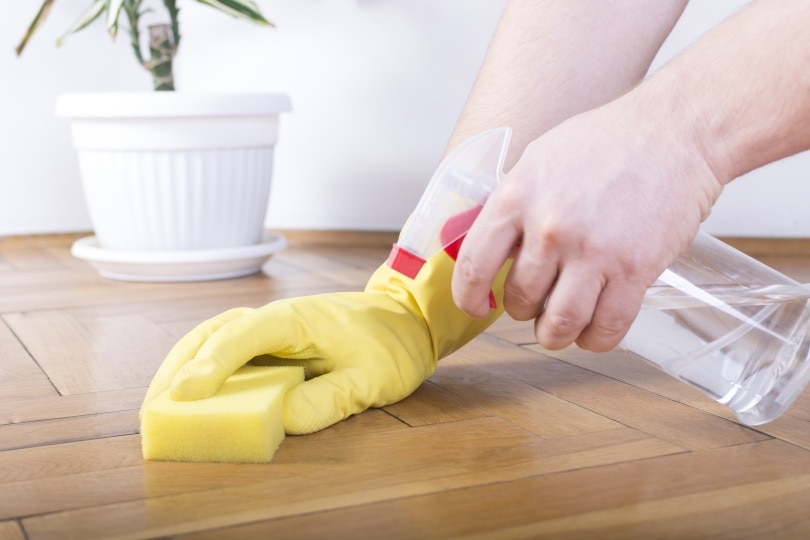
Once the area is dry, spray the vinegar mixture over the stain (or dip a clean rag into the vinegar/water solution and spread it over the stain), and let it sit for about 5 minutes.
Then, mop up the vinegar solution, and repeat the process as many times as you need to until the stain is gone. The older the stain, the more times you’ll need to do this until it’s gone (if it goes).
4. Use Baking Soda
This step follows once you’re happy with the job that the vinegar has done removing the stain. The baking soda helps remove the odor of both the urine and the vinegar.
Sprinkle it quite generously over the stain, and let it sit overnight or at least for a few hours. Ensure that the baking soda is completely covering the stain, as it will draw out the moisture.
5. Use Hydrogen Peroxide If Necessary
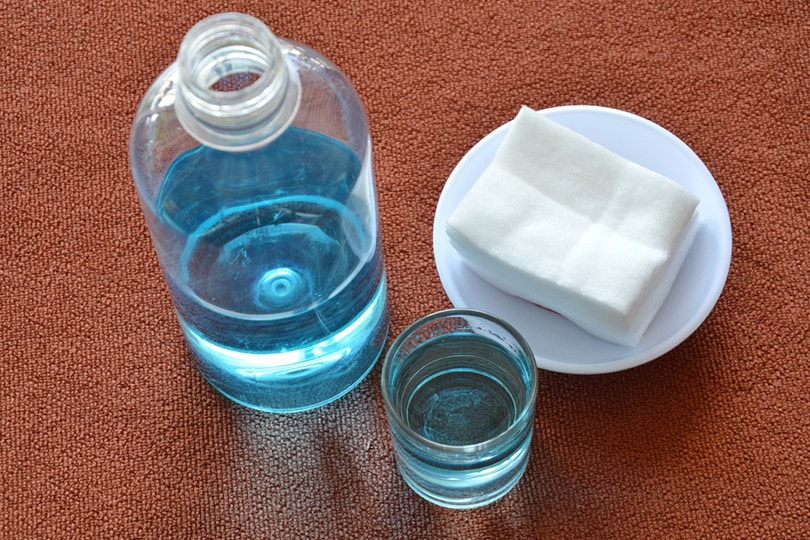
If you’ve tried the vinegar solution multiple times and are still not happy with the result, you can try using hydrogen peroxide. This is only a step to take if you’re feeling desperate, as hydrogen peroxide can potentially damage your floor.
For this reason, only use 3% hydrogen peroxide — any higher percentage will likely cause damage. You might want to test it in an area that will go unnoticed before you begin. You can also dilute it with water.
When you’re ready, take an old but clean washcloth or rag that’s big enough to cover the stain and soak it in the hydrogen peroxide. Wring it out so it isn’t dripping wet. Put the cloth over the spot, and let it sit for a few hours, since it needs time to work. Keep everyone away from this spot while you wait.
When you’re ready, remove the cloth and wipe the floor with another clean cloth and water to remove the hydrogen peroxide. Repeat if necessary.
6. Use an Enzymatic Cleaner
Enzymatic cleaners are effective at removing the stains and odors of bodily fluids. They contain enzymatic bacteria that penetrate the stain and dissolve the ammonia and other organic matter. Aim for a cleaner that’s meant for all surfaces, like material, carpets, and hardwood floors.
Typically, you spray it on the stain, let it sit for a few minutes, and then wipe it off. But for heavier stains and odors, you let it air dry and then vacuum it up. Like with the hydrogen peroxide, it’s a good idea to do a spot test first, as it might discolor the surface of your floor.
If you're trying to find an enzyme cleaner that does it all, we highly recommend our favorite cleaner, the Hepper Advanced Bio-Enzyme Pet Stain & Odor Eliminator Spray.
- ADVANCED ENZYMATIC CLEANER - Penetrates the most stubborn smells and stains at the deepest molecular...
- FOR ANY MESS, ON ANY SURFACE - This pet odor eliminator cleans your carpets, floors, furniture,...
- FRESH, NATURAL ODOR - Our unique formulation doesn't rely on dangerous or unpleasant chemical...
It permanently removes the very worst stains and smells you can imagine and makes clean up a breeze. There's even a 100% satisfaction guarantee! Click here to order a bottle today.
At Pet Keen, we’ve admired Hepper for many years, and decided to take a controlling ownership interest so that we could benefit from the outstanding products of this cool cat company!
 Preventing Your Bunny From Peeing on Your Floor
Preventing Your Bunny From Peeing on Your Floor
Even if you are sure your rabbit is litter trained, accidents can still happen.
Try out a few of these tips to keep your bunny from peeing on the floor:

Conclusion
Most urine stains can be cleaned with things that you may have around the house. White vinegar, baking soda, and hydrogen peroxide all make effective cleaners, and if you already have them, it will cost you nothing beyond time and effort.
You can also invest in an enzymatic cleaner, which is specially formulated to clean these kinds of stains. If the stain is quite old, it might be worth trying one of these sprays.
But if the stain isn’t going anywhere even after your best efforts, you might need to invest in new flooring or have them refinished. You may also want to consider simply throwing down a carpet or scatter rug instead.
Try your best to clean up future accidents quickly, and hopefully, this won’t be a continuing problem.
- You may also be interested in: Why Is My Rabbit’s Pee Red? 7 Possible Reasons (Vet Answer)
Featured Image Credit: mariesacha, Shutterstock



